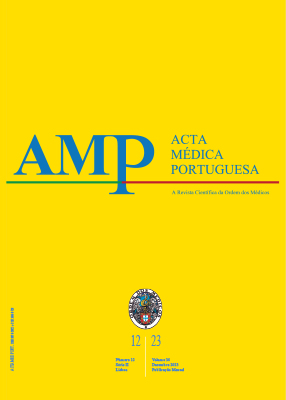Visceral Leishmaniasis in an Immunocompetent Patient: A Case Report
DOI:
https://doi.org/10.20344/amp.19010Keywords:
Amphotericin B/therapeutic use, Immunocompetence, Leishmaniasis, Visceral, Leishmania infantum, Liposomal amphotericin BAbstract
Leishmaniasis is a parasitic disease transmitted by the bite of female sandflies that occurs in tropical and subtropical climate regions. Visceral leishmaniasis is the most serious manifestation of the disease, leading to a 95% mortality rate after two years of infection if untreated. Visceral leishmaniasis is frequently associated with immunocompromised states, with the human immunodeficiency virus being the most prevalent. Most cases of visceral leishmaniasis are caused by the species Leishmania donovani and Leishmania infantum, the latter being the endemic species in the Mediterranean basin. In Portugal, the number of reported cases of visceral leishmaniasis has decreased in the last few years, with 15 cases reported between 2017 and 2021. The authors present a case of visceral leishmaniasis in an immunocompetent patient who manifested the classic pentad: fever, weight loss, hepatosplenomegaly, pancytopenia and hypergammaglobulinemia. The diagnosis was made by the observation of amastigotes of the Leishmania infantum species in the bone marrow aspirate examination, and the patient was successfully treated with liposomal amphotericin B.
Downloads
References
Burza S, Croft SL, Boelaert M. Leishmaniasis. Lancet. 2018;392:951-70. DOI: https://doi.org/10.1016/S0140-6736(18)31204-2
World Health Organization. Leishmaniasis. 2022. [consultado 2022 dez 3]. Disponível em: http://www.who.int/mediacentre/factsheets/fs375/en/.
Haque L, Villanueva M, Russo A, Yuan Y, Lee EJ, Topal J, et al. A rare case of visceral leishmaniasis in an immunocompetent traveler returning to the United States from Europe. PLoS Negl Trop Dis. 2018;12:e0006727. DOI: https://doi.org/10.1371/journal.pntd.0006727
Campino L, Maia C. Epidemiologia das leishmanioses em Portugal. Acta Med Port. 2010;23:859-64.
World Health Organization. Leishmaniasis. Global Health Observatory data repository (GHRD). 2023. [consultado 2023 mar 16]. Disponível em: https://apps.who.int/gho/data/node.main.NTDLEISH?lang=en.
Cortes S, Afonso M, Alves-Pires C, Campino L. Straydogs and leishmaniasis in urban areas, Portugal. Emerg Infect Dis. 2007;13:1431-2. DOI: https://doi.org/10.3201/eid1309.070101
Curtin JM, Aronson NE. Leishmaniasis in the United States: emerging issues in a region of low endemicity. Microorganisms. 2021;9:578. DOI: https://doi.org/10.3390/microorganisms9030578
Aronson N, Herwaldt BL, Libman M, Pearson R, Lopez-Velez R, Weina P, et al. Diagnosis and treatment of leishmaniasis: clinical practice guidelines by the Infectious Diseases Society of America (IDSA) and the American Society of Tropical Medicine and Hygiene (ASTMH). Am J Trop Med Hyg. 2017;96:24-45. DOI: https://doi.org/10.4269/ajtmh.16-84256
Burza S, Sinha PK, Mahajan R, Lima MA, Mitra G, Verma N, et al. Risk factors for visceral leishmaniasis relapse in immunocompetent patients following treatment with 20 mg/kg liposomal amphotericin B (Ambisome) in Bihar, India. PLoS Negl Trop Dis. 2014;8:e2536. DOI: https://doi.org/10.1371/journal.pntd.0002536
Malvolti S, Malhame M, Mantel CF, Le Rutte EA, Kaye PM. Human leishmaniasis vaccines: use cases, target population and potential global demand. PLoS Negl Trop Dis. 2021;15:e0009742. DOI: https://doi.org/10.1371/journal.pntd.0009742
Abdellahi L, Iraji F, Mahmoudabadi A, Hejazi SH. Vaccination in leishmaniasis: a review article. Iran Biomed J. 2022;26:1-35.
Downloads
Published
How to Cite
Issue
Section
License
Copyright (c) 2023 Acta Médica Portuguesa

This work is licensed under a Creative Commons Attribution-NonCommercial 4.0 International License.
All the articles published in the AMP are open access and comply with the requirements of funding agencies or academic institutions. The AMP is governed by the terms of the Creative Commons ‘Attribution – Non-Commercial Use - (CC-BY-NC)’ license, regarding the use by third parties.
It is the author’s responsibility to obtain approval for the reproduction of figures, tables, etc. from other publications.
Upon acceptance of an article for publication, the authors will be asked to complete the ICMJE “Copyright Liability and Copyright Sharing Statement “(http://www.actamedicaportuguesa.com/info/AMP-NormasPublicacao.pdf) and the “Declaration of Potential Conflicts of Interest” (http:// www.icmje.org/conflicts-of-interest). An e-mail will be sent to the corresponding author to acknowledge receipt of the manuscript.
After publication, the authors are authorised to make their articles available in repositories of their institutions of origin, as long as they always mention where they were published and according to the Creative Commons license.









